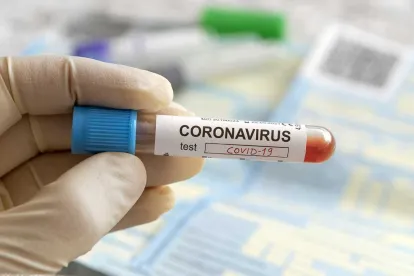At the outset of the COVID-19 pandemic, the U.S. Equal Employment Opportunity Commission (EEOC) took the position that the Americans with Disabilities Act (ADA) standard for conducting medical examinations (job-related and consistent with business necessity) was always met for COVID-19 viral screening testing. On July 12, 2022, the EEOC updated its position in light of the evolving nature of the COVID-19 pandemic. Now employers are required to “assess whether current pandemic circumstances and individual workplace circumstances justify viral screening testing.”
The EEOC made it clear that this new update is not a pronouncement on whether “testing is or is not warranted.” Instead, the new update allows employers to make their own assessments, given the evolving nature of the pandemic, to determine whether testing is consistent with the requirements of the ADA. The EEOC has given several possible considerations for employers evaluating the business necessity of viral testing, including the
-
vaccination status of employees;
-
accuracy and speed of the various types of COVID-19 viral tests;
-
likelihood of breakthrough infections in those up to date on vaccinations;
-
possible severity of illness and ease of transmissibility of the current variant or variants;
-
type of contacts employees may have with others in the workplace or elsewhere (e.g., contact with medically vulnerable individuals); and
-
potential impact on operations if an employee enters the workplace with COVID-19.
The EEOC directs employers to check the latest U.S. Centers for Disease Control and Prevention guidance to determine whether viral screening testing is appropriate for the employees who will be tested. It is important to note that any testing must be viral, as the EEOC continues to forbid antibody testing.
The EEOC also modified its guidance for employers’ requirements of an employee returning to work after a COVID-19 infection. The EEOC continues to allow an employer to require a doctor’s note certifying it is safe for an employee to return (no risk of transmission) and that the employee is able to perform the job duties. The EEOC notes that COVID-19 is not always a disability, so such an inquiry might not be a disability-related inquiry; if it were, however, “it would be justified” because it would be consistent with the business necessity standard, as it would be “related to the possibility of transmission and/or related to [the] employer’s objective concern about the employee’s ability to resume working.” The EEOC now also states that employers may, as an alternative, simply follow CDC guidance to determine whether it is safe for an employee to return.
Key Takeaways
Employers may want to consider examining any mandatory screening testing program to determine whether it is consistent with business necessity. In addition, employers may want to continue to monitor the ever-changing guidance from the CDC, as well as state and local health departments, when reviewing their COVID-19 screening and response protocols. Employers may also want to keep records of the changing guidance, as this will allow them to demonstrate reliance on these changes for any future challenges to their COVID-19 policies.





 />i
/>i

